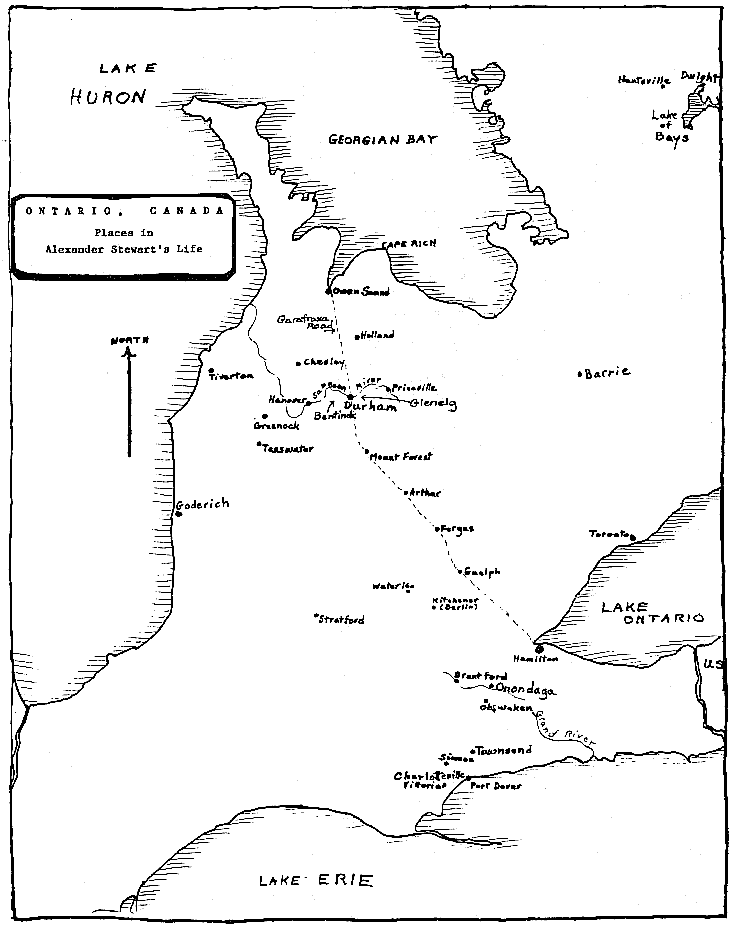EMIGRATION TO CANADA: 1832
Aberdeen was heavily involved in the Canadian
timber trade so ships on the westward voyage took passengers direct from Aberdeen, often
making two trips a year. Emigrants were told to bring enough food, mostly oatmeal, for
four to six weeks. Shipmasters were supposed to provide water and temporarily-installed
berths. Historian Marjorie Harper wrote about emigration from Aberdeen to Canada at that
period:
A voyage in an emigrant ship was no luxury cruise, but an endurance test which did
nothing to build up the passengers' strength for the challenges of the new life which lay
ahead. Most emigrants could not afford a cabin passage, and were therefore accommodated in
the steerage, between the decks of the vessel. Here they were kept in cramped, insanitary
conditions during a voyage which could last for anything from four weeks to three months,
even on the transatlantic run... On fine days they could at least escape onto the deck,
but during stormy weather, when the hatches were battened down, the passengers were
confined for days on end to their squalid quarters, where the air was thick with smoke and
the smell of vomit and unwashed bodies. These conditions provided an ideal breeding ground
for contagious disease...
It says much for the family's toughness that Alexander, his five half-brothers and
sisters, two brothers-in-law, and nieces and nephews all survived such trips. HSS
continued:
So in March 1832 grandfather sailed from Aberdeen for Québec on the
brig Annandale. There were sixty passengers and the fare was three pounds sterling. On
this lumber vessel passengers boarded themselves. On May 20, 1832, the ship landed in
Québec...
The voyage was rough and lasted seven weeks [JWAS wrote]. At the end of it he stepped
ashore, a sturdy Scotch youth of eighteen, with a total capital of three pence in his
pocket.
A certain merchant [HSS continued], John Hosack by name, a Scotchman
from near Elgin, had come on board seeking a hand as general helper in a wholesale and
retail grocery which was located on Champlain Street opposite the King's Wharf. The
Captain recommended grandfather because of his conduct on board ship, and so he was
employed in the storehouse, loading and unloading, taking in and sending out good. The
wages were $5.00 per month and board.
After some time in Québec [AMS told], he moved to Montréal and continued to work as a
dockhand. This work fitted his short and stocky body and broad shoulders. This broad,
square-shouldered feature has been inherited by some of his grandsons, and has been a
large influence in causing them to prefer the paddling and canoe trips of Muskoka to the
long-limbed sports of tennis and baseball.
Shortly after grandfather's arrival [HSS continued] cholera broke
out in Québec (June 8). On a Sunday morning he took a walk to the English cemetery, which turned out to be a rather gruesome experience as he saw about
two hundred boxes containing bodies piled on the ground with no place to inter them, and
as he returned he met five cartloads of corpses from the emigrant office. Maybe this
influenced him to wish to get out of Québec.
Gary Thomson has written of Grosse Île, the "Island of the Sorrows" which
was the immigration quarantine station for Québec City until 1937:
The rush of immigrants began shortly after the Napoleonic Wars ended in 1815 as armies
of men sought new livelihoods. Land clearances in Scotland and industrialization
throughout Great Britain convinced many small farmers to emigrate... The great timber
fleets carried much of this "walking ballast" to North America. In their greed
and haste many shipmasters provided skimpy provisions, overcrowding and sickly conditions
for the impoverished migrants.
Often the ships carried fever and contagion. In 1832 the colonial legislature responded
to local fears of a virulent cholera epidemic in Europe and Britain. Assembly members
chose the isolated island of Grosse Île on which to build a quarantine station.
The Passenger Act specified procedures for all incoming ships: Stop for inspection at
designated buoy markers; signal the presence of onboard sick with a blue flag; procure a
certificate of health before proceeding to Québec.
Still, the volume of immigrant traffic that spring overwhelmed the small facility. By
early June 397 ships had arrived and the dying began in earnest. Medical personnel passed
many ships along to Québec with only cursory inspection. By late summer the city reported
3,200 cholera deaths. More than that perished at Grosse Île.
In addition to the possibility that this horror influenced Alexander to leave Québec
City, there were other reasons to move on. HSS continued:
Certainly he was a bit homesick, and also he wanted higher wages.
Peter had gone on to Upper Canada, so after three months with the merchant, grandfather
left by steamer for Montréal where he got employment in Bradbury and Co.'s wholesale
drygoods store on Notre Dame Street close to the French Church, at $8.00 per month, an
increase of $2.00 over his predecessor due to the recommendation of his former employer in
Québec.
About the time when Alex Stewart was in Montréal [AMS added]...the part of Ontario
north of Lake Erie and west of Toronto, called Canada West, was being opened up for
settlement by a great land sales company, and the lure of cheap farm lands caused Alex
Stewart to join the procession of British immigrants who were going there.
|



